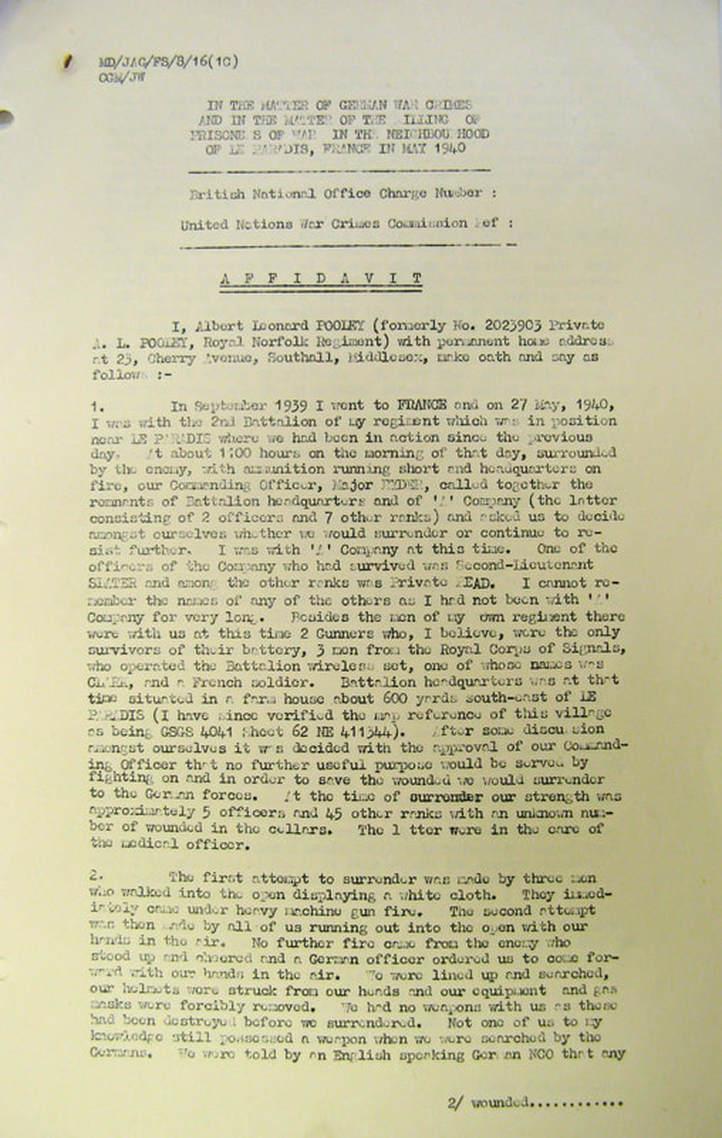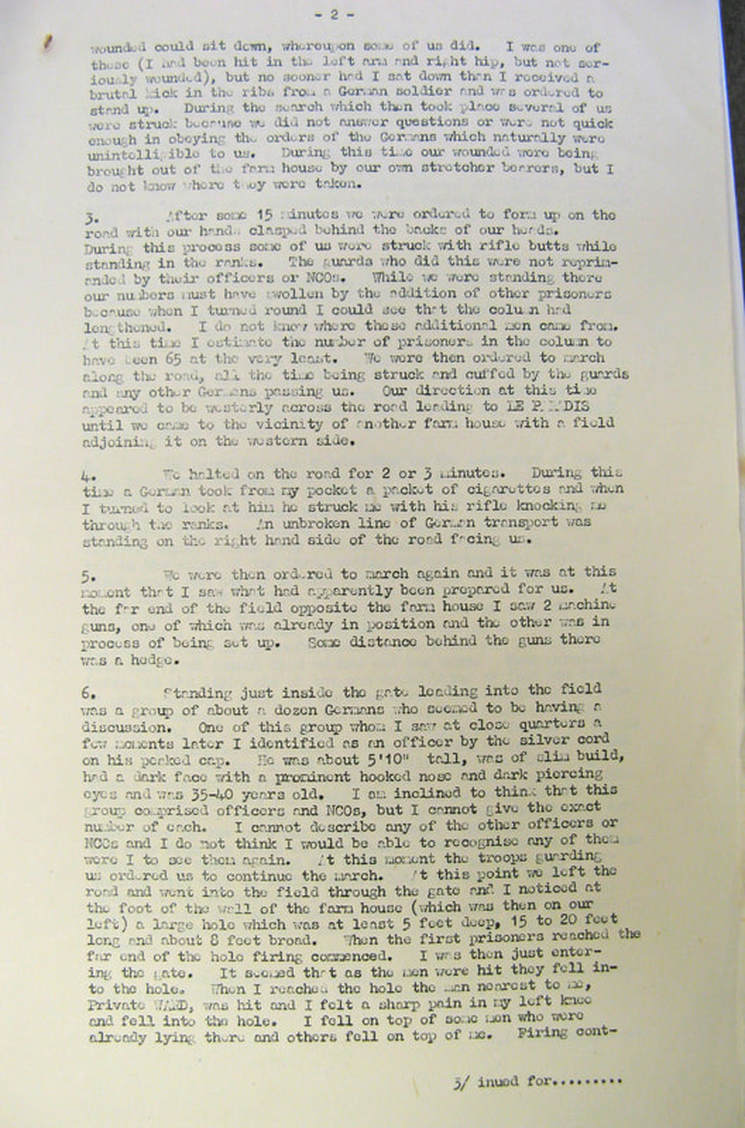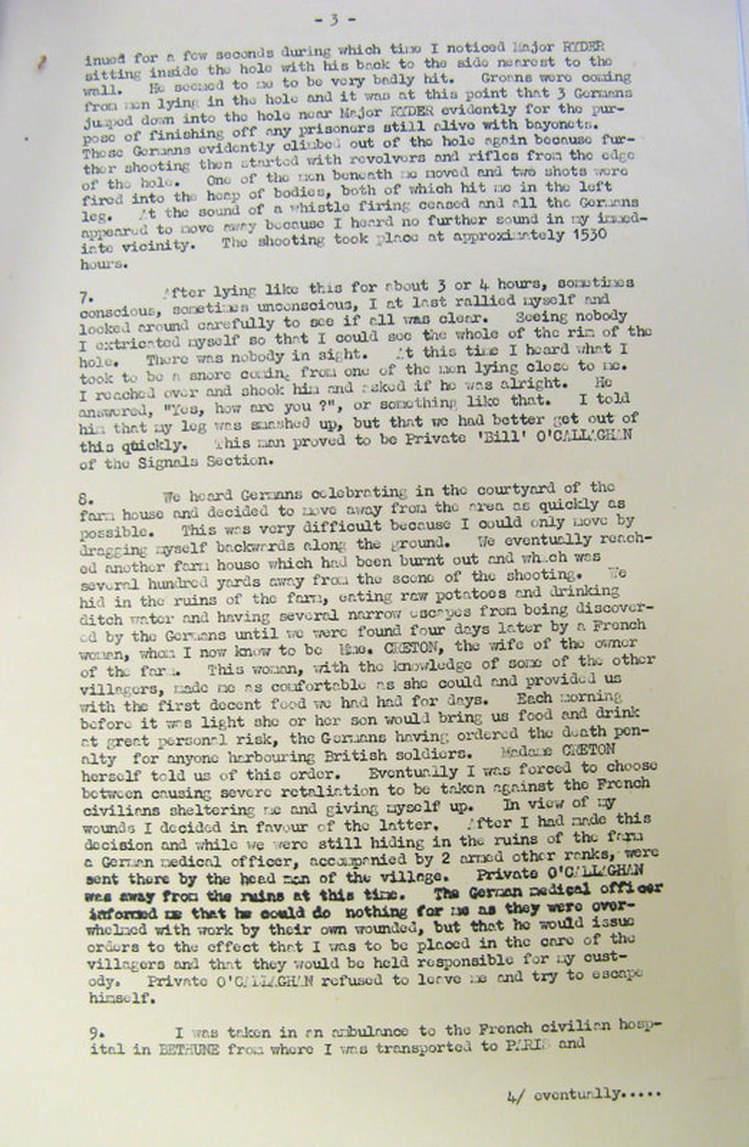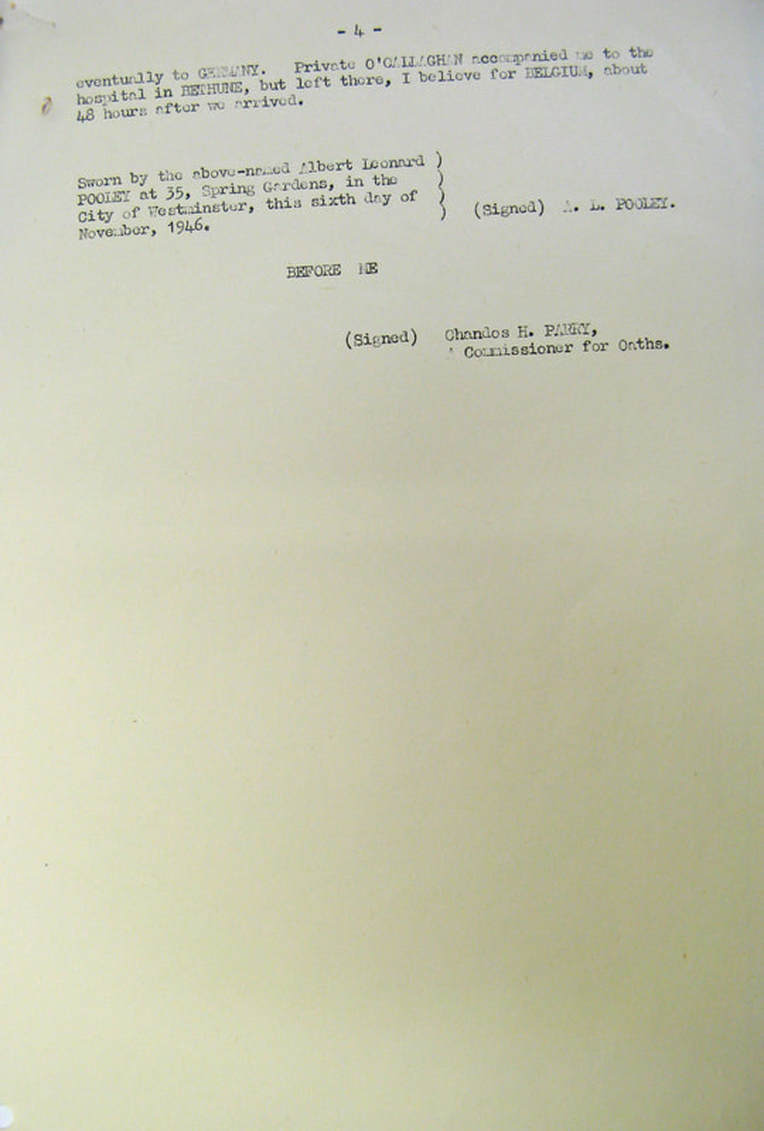The following is the affidavit of Bert Pooley taken on November 6th, 1946 after the war: The Affidavit is headed as follows:
IN THE MATTER OF GERMAN WAR CRIMES AND IN THE MATTER OF THE KILLING OF BRITISH PRISONERS OF WAR IN THE NEIGHBOURHOOD OF LE PARADIS IN MAY 1940:
"I Albert Leonard POOLEY (formerly No 2023903 Private A.L. Pooley, Royal Norfolk Regiment) with permanent home address at 23 Cherry Avenue, Southall, Middlesex, make oath and say as follows:-
1 In September 1939 I went to FRANCE and on 27 May, 1940, I was with the 2nd Battalion of my regiment which was in position near LE PARADIS where we had been in action since the previous day. At about 11.00 hours on the morning of that day, surrounded by the enemy, with ammunition running short and headquarters on fire, our Commanding Officer, Major Ryder, called together the remnants of Battalion headquarters and A Company (the latter consisting of 2 officers and 7 other ranks) and asked us to decide amongst ourselves whether we would surrender or continue to resist further. I was with A Company at this time. One of the officers of the Company who had survived was Second lieutenant SLATER and among the other ranks was Private READ. I cannot remember the names of any of the others as I had not been with A Company for very long. Besides the men of my own regiment there were with us at this time 2 Gunners who, I believe, were the only survivors of their battery, 3 men from the Royal Corps of Signals, who operated the Battalion wireless set, one of whose names was CLARK, and a French soldier. Battalion headquarters was at that time situated in a farmhouse about 600 yards south-east of LE PARADIS (I have since verified the map reference of this village as being GSGS 4041 Sheet 62 NE 411344). After some discussion amongst ourselves it was decided with the approval of our Commanding Officer that no further useful purpose would be served by fighting on and in order to save the wounded we would surrender to the German forces. At the time of surrender our strength was approximately 5 officers and 45 other ranks with an unknown number of wounded in the cellars. The latter were in the care of the medical officer.
2 The first attempt to surrender was made by three men who walked into the open displaying a white cloth. They immediately came under heavy machine gun fire. The second attempt was then made by all of us running out into the open with our hands in the air. No further fire came from the enemy who stood up and cheered and a German officer ordered us to come forward with our hands in the air. We were lined-up and searched, our helmets were struck from our heads and our equipment and gas masks were forcibly removed. We had no weapons with us as these had been destroyed before we surrendered. Not one of us to my knowledge still possessed a weapon when we were searched by the Germans. We were told by an English speaking German NCO that any wounded could sit down, whereupon some of us did. I was one of those (I had been hit in the left arm and right hip, but not seriously wounded), but no sooner had I sat down then I received a brutal kick in the ribs from a German soldier and was ordered to stand up. During the march which then took place several of us were struck because we did not answer questions or were not quick enough in obeying the orders of the Germans which naturally were unintelligible to us. During this time our wounded were being brought out of the farm house by our own stretcher bearers, but I do not know where they were taken.
3 After some 15 minutes we were ordered to form up on the road with our hands clasped behind the backs of our heads. During this process some of us were struck with rifle butts while standing in the ranks. The guards who did this were not reprimanded by their officers or NCOs. While we were standing there our numbers must have been swollen by the addition of other prisoners because when I turned round I could see that the column had lengthened. I do not know where these additional men came from. At this time I estimate the number of prisoners in the column to have been 65 at the very least. We were then ordered to march along the road, all the time being struck and cuffed by the guards and any other Germans passing us. Our direction at this time appeared to be westerly across the road leading to LE PARADIS until we came to the vicinity of another farm house with a field adjoining it on the western side.
4 We halted on the road for 2 or 3 minutes. During this time a German took from my pocket a packet of cigarettes and when I turned to look at hom he struck me with his rifle knocking me through the ranks. An unbroken line of German transport was standing on the right hand side of the road facing us.
5 We were then ordered to march again and it was at this moment that I saw what had apparently been prepared for us. At the far end of the field opposite the farm house I saw 2 machine guns, one of which was already in position and the other was in process of being set up. Some distance behind the guns there was a hedge.
6 Standing just inside the gate leading into the field was a group of about a dozen Germans who seemed to be having a discussion. One of this group whom I saw at close quarters a few minutes later I identified as an officer by the silver cord on his peaked cap. He was about 5ft 10in tall, was of slim build, had a dark face with a prominent hooked nose and dark piercing eyes and was 35-40 years old. I am inclined to think that this group comprised officers and NCOs, but I cannot give the exact number of each. I cannot describe any of the other officers or NCOs and I do not think that I would be able to recognise any of them were I to see them again. At this moment the troops guarding us ordered us to continue the march. At this point we left the road and went into the field through the gate and I noticed at the foot of the wall of the farm house (which was then on our left) a large hole which was at least five feet deep, 15 to 20 feet long and about 8 feet broad. When the first prisoners reached the far end of the hole firing commenced. I was then just entering the gate. It seemed that as the men were hit they fell into the hole. When I reached the hole the man nearest to me, Private WARD, was hit and I felt a sharp pain in my left knee and fell into the hole. I fell on top of some men who were already lying there and others fell on top of me. Firing continued for a few seconds during which time I noticed Major RYDER sitting inside the hole with his back to the side nearest to the wall. He seemed to me to be very badly hit. Groans were coming from men lying in the hole and it was at this point that 3 Germans jumped down into the hole near Major RYDER evidently for the purpose of finishing off any prisoners still alive with bayonets. These Germans evidently climbed out of the hole again because further shooting then started with revolvers and rifles from the edge of the hole. One of the men beneath me moved and two shots were fired into the heap of bodies, both of which hit me in the left leg. At the sound of a whistle firing ceased and all the Germans appeared to move away because I heard no further sound in my immediate vicinity. The shooting took place at approximately 15.30 hours.
7 After lying like this for about 3 or 4 hours, sometimes conscious, sometimes unconscious, I at last rallied myself and looked around carefully to see if all was clear. Seeing nobody I extricated myself so that I could see the whole of the rim of the hole. There was nobody in sight. At this time I heard what I took to be a snore coming from one of the men close to me. I reached over and shook him and asked if he was alright. He answered "Yes, how are you?", or something like that. I told him that my leg was smashed up, but that we had better get out of this quickly. This man proved to be Private BILL O'CALLAGHAN of the Signals Section.
8 We heard Germans celebrating in the courtyard of the farm house and decided to move away from the area as quickly as possible. This was very difficult because I could only move by dragging myself backwards along the ground. We eventually reached another farm house which had been burnt out and which was several hundred yards away from the scene of the shooting. We hid in the ruins of the farm, eating raw potatoes and drinking ditch water and having several narrow escapes from being discovered by the Germans until we were found four days later by a French woman, whom I now know to be Mme. CRETON, the wife of the owner of the farm. This woman, with the knowledge of some of the other villagers, made me as comfortable as she could and provided us with the first decent food we had had for four days. Each morning before it was light she or her son would bring us food and drink at great personal risk, the Germans having ordered the death penalty for anyone harbouring British soldiers. Madame CRETON herself told us of this order. Eventually I was forced to choose between causing severe retaliation to be taken against the French civilians sheltering me and giving myself up. In view of my wounds I decided to favour the latter. After I had made this decision and while we were still hiding in the ruins of the farm a German medical officer, accompanied by 2 armed other ranks, were sent there by the head man of the village. Private O'CALLAGHAN was away from the ruins at this time. The German medical officer informed me that he could do nothing for me as they were overwhelmed with work by their own wounded, but that he would issue orders to the effect that I was to be placed in the care of the villagers and that they would be held responsible for my custody. Private O'CALLAGHAN refused to leave me and try to escape himself.
9 I was taken in an ambulance to the French civilian hospital in BETHUNE from where I was transported to PARIS and eventually to GERMANY. Private O'CALLAGHAN accompanied me to the hospital in BETHUNE, but left there, I believe for BELGIUM, about 48 hours after we arrived.
Sworn by the above named Albert Leonard POOLEY at 35, Spring Gardens, in the city of Westminster, this sixth day of November 1946. Signed in the presence of Chandos H. PERRY, A Commissioner for Oath.
IN THE MATTER OF GERMAN WAR CRIMES AND IN THE MATTER OF THE KILLING OF BRITISH PRISONERS OF WAR IN THE NEIGHBOURHOOD OF LE PARADIS IN MAY 1940:
"I Albert Leonard POOLEY (formerly No 2023903 Private A.L. Pooley, Royal Norfolk Regiment) with permanent home address at 23 Cherry Avenue, Southall, Middlesex, make oath and say as follows:-
1 In September 1939 I went to FRANCE and on 27 May, 1940, I was with the 2nd Battalion of my regiment which was in position near LE PARADIS where we had been in action since the previous day. At about 11.00 hours on the morning of that day, surrounded by the enemy, with ammunition running short and headquarters on fire, our Commanding Officer, Major Ryder, called together the remnants of Battalion headquarters and A Company (the latter consisting of 2 officers and 7 other ranks) and asked us to decide amongst ourselves whether we would surrender or continue to resist further. I was with A Company at this time. One of the officers of the Company who had survived was Second lieutenant SLATER and among the other ranks was Private READ. I cannot remember the names of any of the others as I had not been with A Company for very long. Besides the men of my own regiment there were with us at this time 2 Gunners who, I believe, were the only survivors of their battery, 3 men from the Royal Corps of Signals, who operated the Battalion wireless set, one of whose names was CLARK, and a French soldier. Battalion headquarters was at that time situated in a farmhouse about 600 yards south-east of LE PARADIS (I have since verified the map reference of this village as being GSGS 4041 Sheet 62 NE 411344). After some discussion amongst ourselves it was decided with the approval of our Commanding Officer that no further useful purpose would be served by fighting on and in order to save the wounded we would surrender to the German forces. At the time of surrender our strength was approximately 5 officers and 45 other ranks with an unknown number of wounded in the cellars. The latter were in the care of the medical officer.
2 The first attempt to surrender was made by three men who walked into the open displaying a white cloth. They immediately came under heavy machine gun fire. The second attempt was then made by all of us running out into the open with our hands in the air. No further fire came from the enemy who stood up and cheered and a German officer ordered us to come forward with our hands in the air. We were lined-up and searched, our helmets were struck from our heads and our equipment and gas masks were forcibly removed. We had no weapons with us as these had been destroyed before we surrendered. Not one of us to my knowledge still possessed a weapon when we were searched by the Germans. We were told by an English speaking German NCO that any wounded could sit down, whereupon some of us did. I was one of those (I had been hit in the left arm and right hip, but not seriously wounded), but no sooner had I sat down then I received a brutal kick in the ribs from a German soldier and was ordered to stand up. During the march which then took place several of us were struck because we did not answer questions or were not quick enough in obeying the orders of the Germans which naturally were unintelligible to us. During this time our wounded were being brought out of the farm house by our own stretcher bearers, but I do not know where they were taken.
3 After some 15 minutes we were ordered to form up on the road with our hands clasped behind the backs of our heads. During this process some of us were struck with rifle butts while standing in the ranks. The guards who did this were not reprimanded by their officers or NCOs. While we were standing there our numbers must have been swollen by the addition of other prisoners because when I turned round I could see that the column had lengthened. I do not know where these additional men came from. At this time I estimate the number of prisoners in the column to have been 65 at the very least. We were then ordered to march along the road, all the time being struck and cuffed by the guards and any other Germans passing us. Our direction at this time appeared to be westerly across the road leading to LE PARADIS until we came to the vicinity of another farm house with a field adjoining it on the western side.
4 We halted on the road for 2 or 3 minutes. During this time a German took from my pocket a packet of cigarettes and when I turned to look at hom he struck me with his rifle knocking me through the ranks. An unbroken line of German transport was standing on the right hand side of the road facing us.
5 We were then ordered to march again and it was at this moment that I saw what had apparently been prepared for us. At the far end of the field opposite the farm house I saw 2 machine guns, one of which was already in position and the other was in process of being set up. Some distance behind the guns there was a hedge.
6 Standing just inside the gate leading into the field was a group of about a dozen Germans who seemed to be having a discussion. One of this group whom I saw at close quarters a few minutes later I identified as an officer by the silver cord on his peaked cap. He was about 5ft 10in tall, was of slim build, had a dark face with a prominent hooked nose and dark piercing eyes and was 35-40 years old. I am inclined to think that this group comprised officers and NCOs, but I cannot give the exact number of each. I cannot describe any of the other officers or NCOs and I do not think that I would be able to recognise any of them were I to see them again. At this moment the troops guarding us ordered us to continue the march. At this point we left the road and went into the field through the gate and I noticed at the foot of the wall of the farm house (which was then on our left) a large hole which was at least five feet deep, 15 to 20 feet long and about 8 feet broad. When the first prisoners reached the far end of the hole firing commenced. I was then just entering the gate. It seemed that as the men were hit they fell into the hole. When I reached the hole the man nearest to me, Private WARD, was hit and I felt a sharp pain in my left knee and fell into the hole. I fell on top of some men who were already lying there and others fell on top of me. Firing continued for a few seconds during which time I noticed Major RYDER sitting inside the hole with his back to the side nearest to the wall. He seemed to me to be very badly hit. Groans were coming from men lying in the hole and it was at this point that 3 Germans jumped down into the hole near Major RYDER evidently for the purpose of finishing off any prisoners still alive with bayonets. These Germans evidently climbed out of the hole again because further shooting then started with revolvers and rifles from the edge of the hole. One of the men beneath me moved and two shots were fired into the heap of bodies, both of which hit me in the left leg. At the sound of a whistle firing ceased and all the Germans appeared to move away because I heard no further sound in my immediate vicinity. The shooting took place at approximately 15.30 hours.
7 After lying like this for about 3 or 4 hours, sometimes conscious, sometimes unconscious, I at last rallied myself and looked around carefully to see if all was clear. Seeing nobody I extricated myself so that I could see the whole of the rim of the hole. There was nobody in sight. At this time I heard what I took to be a snore coming from one of the men close to me. I reached over and shook him and asked if he was alright. He answered "Yes, how are you?", or something like that. I told him that my leg was smashed up, but that we had better get out of this quickly. This man proved to be Private BILL O'CALLAGHAN of the Signals Section.
8 We heard Germans celebrating in the courtyard of the farm house and decided to move away from the area as quickly as possible. This was very difficult because I could only move by dragging myself backwards along the ground. We eventually reached another farm house which had been burnt out and which was several hundred yards away from the scene of the shooting. We hid in the ruins of the farm, eating raw potatoes and drinking ditch water and having several narrow escapes from being discovered by the Germans until we were found four days later by a French woman, whom I now know to be Mme. CRETON, the wife of the owner of the farm. This woman, with the knowledge of some of the other villagers, made me as comfortable as she could and provided us with the first decent food we had had for four days. Each morning before it was light she or her son would bring us food and drink at great personal risk, the Germans having ordered the death penalty for anyone harbouring British soldiers. Madame CRETON herself told us of this order. Eventually I was forced to choose between causing severe retaliation to be taken against the French civilians sheltering me and giving myself up. In view of my wounds I decided to favour the latter. After I had made this decision and while we were still hiding in the ruins of the farm a German medical officer, accompanied by 2 armed other ranks, were sent there by the head man of the village. Private O'CALLAGHAN was away from the ruins at this time. The German medical officer informed me that he could do nothing for me as they were overwhelmed with work by their own wounded, but that he would issue orders to the effect that I was to be placed in the care of the villagers and that they would be held responsible for my custody. Private O'CALLAGHAN refused to leave me and try to escape himself.
9 I was taken in an ambulance to the French civilian hospital in BETHUNE from where I was transported to PARIS and eventually to GERMANY. Private O'CALLAGHAN accompanied me to the hospital in BETHUNE, but left there, I believe for BELGIUM, about 48 hours after we arrived.
Sworn by the above named Albert Leonard POOLEY at 35, Spring Gardens, in the city of Westminster, this sixth day of November 1946. Signed in the presence of Chandos H. PERRY, A Commissioner for Oath.



